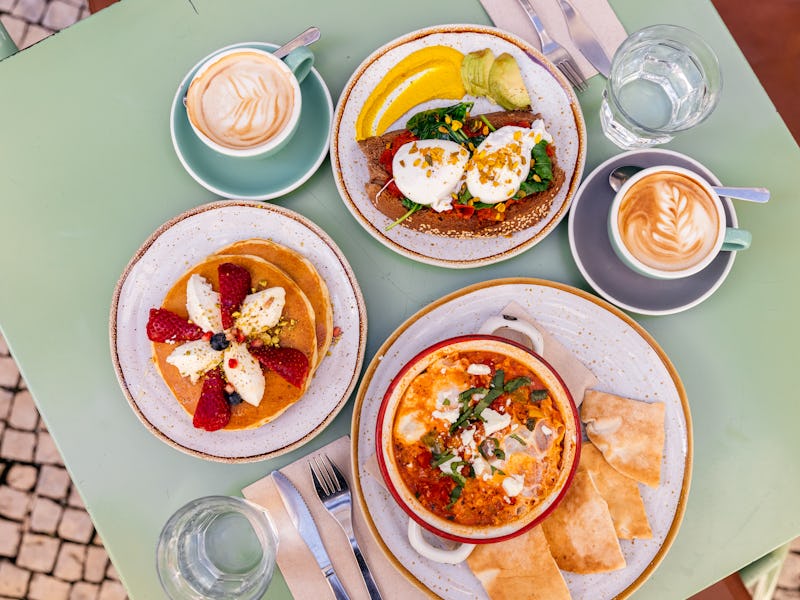How important is breakfast, really? A health expert explains how to do it right
It all depends on the breakfaster.

The meaning of the word “breakfast” hides in plain sight: breaking a fast.
“I think the idea of breakfast is interesting,” Steven Malin, a health professor at Rutgers University, tells Inverse. “We typically think of certain foods as breakfast foods, but in reality, all breakfast refers to is breaking the fast from sleep.”
Technically, then, whatever you first eat after waking up (presumably) in the morning is breakfast, be it coffee, protein bar, or dinner. The objective health benefits of breakfast are a little more slippery, though some believe that a regular breakfast in the morning fires up the body’s metabolism and helps stave off obesity.
What it comes down to, Malin says, is what one is trying to accomplish by eating (or skipping) breakfast, and what one’s body needs most.
Is breakfast the most important meal?
Breakfast’s claim as the paramount meal comes from its status as the first energy one consumes after fasting for eight to 12 hours. Malin points to evidence that breakfast improves cognition and decreases hunger. The assertion that breakfast jumpstarts the metabolism, however, “doesn’t seem to pan out as much,” he writes. While it’s true that regularly eating breakfast is associated with lower body weights, that may be associated more with daily hunger rather than how the metabolism operates.
It also depends on the breakfaster. For someone concerned with blood glucose control, skipping breakfast may make blood sugar harder to control later in the day. Those who exercise in the morning or daytime will likely perform better with breakfast in them. On the flip side, Malin says that people who consume breakfast are also more active throughout the day, so it provides energy to accomplish more.
“This is important as movement throughout the day contributes to lower mortality/diabetes risks independent of exercise,” Malin writes.
What if I skip breakfast?
First, that depends on what you mean by skipping breakfast.
Eating nothing at all means your fast lasts ever longer. The body is deceptively active at night as we sleep, converting stored carbs and fat called glycogen into glucose to power red blood cells and the brain. But, Malin says, the longer one waits to eat after waking up means the body shifts from using stored fat to breaking down muscle proteins to provide the body with raw materials for glucose. As such, a long-term concern of constantly skipping breakfast, he says, is muscle loss.
A more obvious, short-term consequence is dealing with the effects of hunger. Increased hunger could make paying attention to work or school more difficult, as the brain is short of immediate glucose for an energy supply.
Some research suggests skipping breakfast is associated with weight gain and obesity, which come with a slew of health risks, but this concern is less about impacts on metabolism.
“Some work suggests people then compensate throughout the day by nibbling on foods more or even eat later at night,” Malin says. He adds that late-night eating may be associated with risk for diseases like type 2 diabetes and potentially anxiety.
Downing a coffee may also be a form of skipping breakfast, but it still puts calories in the body, especially with sugar and creamer to increase insulin levels.
What makes a good breakfast?
“That’s a hard question to answer,” Malin writes. Ultimately, it depends on what one is trying to accomplish. Someone with type 2 diabetes looking to maintain weight will eat a different breakfast than someone without diabetes trying to lose weight. (Malin confirms that skipping breakfast isn’t a good plan for weight loss.)
He says that processed foods could lead to over-eating because they’re less nutrient-dense than unprocessed foods. Eating a favorite sugary cereal may do wonders for our happiness, but it could leave one hungry an hour later. That doesn’t exclude Cinnamon Toast Crunch altogether, but maybe have an egg or whole-grain toast with that bowl. These unprocessed foods are especially important for restoring nutrients depleted during sleep — and this is doubly true for those who exercise regularly.
In analyzing what makes a hearty American breakfast, Malin estimates that from a daily 2000-calorie diet, a 400-calorie breakfast (give or take) may do the trick. He points to a piece of fruit, a protein source, and morning coffee or tea as a respectable meal.
For breakfast newbies, something is better than nothing, and steering toward a few hundred calories from unprocessed foods will replenish the body’s energy.
CHECK, PLEASE is an Inverse series that uses biology, chemistry, and physics to debunk the biggest food myths and assumptions.
Now read this: Is green coffee good for you? A food scientist debunks the hype